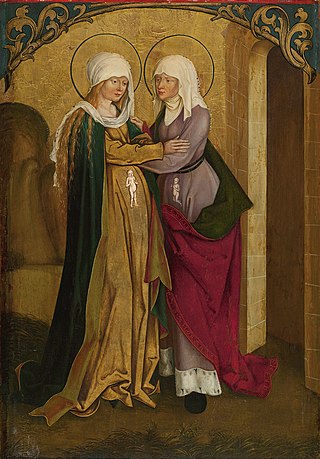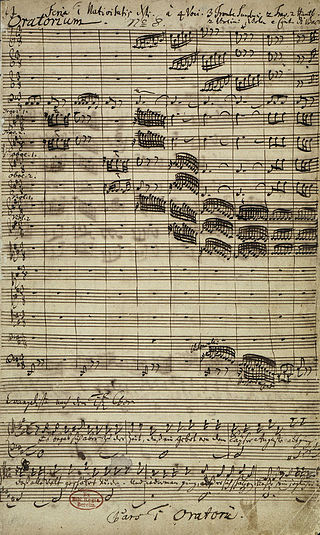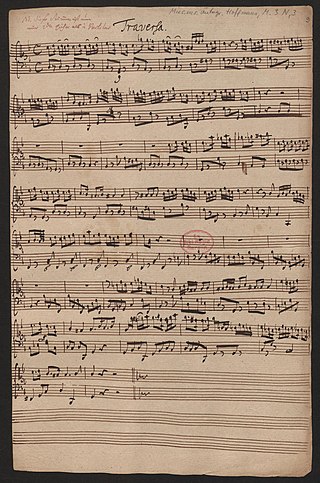The Bach-Werke-Verzeichnis is a catalogue of compositions by Johann Sebastian Bach. It was first published in 1950, edited by Wolfgang Schmieder. The catalogue's second edition appeared in 1990. An abbreviated version of that second edition, known as BWV2a, was published in 1998.

Liebster Gott, wenn werd ich sterben?, BWV 8, is a church cantata for the 16th Sunday after Trinity by Johann Sebastian Bach. It is a chorale cantata, part of Bach's second cantata cycle. Bach performed it for the first time on 24 September 1724 in St. Nicholas Church in Leipzig. The cantata is scored for SATB singers, four wind instruments, strings and continuo.

In 1724 Johann Sebastian Bach composed the church cantata Meine Seel erhebt den Herren, BWV 10, as part of his second cantata cycle. Taken from Martin Luther's German translation of the Magnificat canticle, the title translates as "My soul magnifies the Lord". Also known as Bach's German Magnificat, the work follows his chorale cantata format.

The Christmas Oratorio, BWV 248, is an oratorio by Johann Sebastian Bach intended for performance in church during the Christmas season. It is in six parts, each part a cantata intended for performance in a church service on a feast day of the Christmas period. It was written for the Christmas season of 1734 and incorporates music from earlier compositions, including three secular cantatas written during 1733 and 1734 and a largely lost church cantata, BWV 248a. The date is confirmed in Bach's autograph manuscript. The next complete public performance was not until 17 December 1857 by the Sing-Akademie zu Berlin under Eduard Grell. The Christmas Oratorio is a particularly sophisticated example of parody music. The author of the text is unknown, although a likely collaborator was Christian Friedrich Henrici (Picander).

Johann Sebastian Bach's Magnificat, BWV 243, is a musical setting of the biblical canticle Magnificat. It is scored for five vocal parts, and a Baroque orchestra including trumpets and timpani. It is the first major liturgical composition on a Latin text by Bach.
O ewiges Feuer, o Ursprung der Liebe, BWV 34.2 is an incomplete wedding cantata composed by Johann Sebastian Bach, of which only the complete libretto and some parts have survived.

Uns ist ein Kind geboren, BWV 142 / Anh. II 23, is a Christmas cantata by an unknown composer. In the Bach-Werke-Verzeichnis it is listed among the works with a doubtful attribution to Johann Sebastian Bach. The text is based on a libretto by Erdmann Neumeister first published in 1711. Although attributed to Bach by the Bach-Gesellschaft when they first published it in the late nineteenth century, that attribution was questioned within thirty years and is no longer accepted. Johann Kuhnau, Bach's predecessor as Thomaskantor in Leipzig, has been suggested as the probable composer, but without any certainty.

Unser Mund sei voll Lachens, BWV 110, is a church cantata by Johann Sebastian Bach. He composed the Christmas cantata in Leipzig for Christmas Day and first performed it on 25 December 1725.
Most of Johann Sebastian Bach's extant church music in Latin—settings of the Mass ordinary and of the Magnificat canticle—dates from his Leipzig period (1723–50). Bach started to assimilate and expand compositions on a Latin text by other composers before his tenure as Thomaskantor in Leipzig, and he continued to do so after he had taken up that post. The text of some of these examples by other composers was a mixture of German and Latin: also Bach contributed a few works employing both languages in the same composition, for example his early Kyrie "Christe, du Lamm Gottes".

Sie werden aus Saba alle kommen, BWV 65, is a church cantata by Johann Sebastian Bach. He composed it in 1724 in Leipzig for Epiphany and first performed it on 6 January 1724 as part of his first cantata cycle.

The Magnificat in E-flat major, BWV 243a, also BWV 243.1, by Johann Sebastian Bach is a musical setting of the Latin text of the Magnificat, Mary's canticle from the Gospel of Luke. It was composed in 1723 and is in twelve movements, scored for five vocal parts and a Baroque orchestra of trumpets, timpani, oboes, strings and basso continuo including bassoon. Bach revised the work some ten years later, transposing it from E-flat major to D major, and creating the version mostly performed today, BWV 243.

BWV Anh., abbreviation of Bach-Werke-Verzeichnis Anhang, is a list of lost, doubtful, and spurious compositions by, or once attributed to, Johann Sebastian Bach.
Bach's first cantata cycle refers to the church cantatas Johann Sebastian Bach composed for the somewhat less than 60 occasions of the liturgical year of his first year as Thomaskantor in Leipzig which required concerted music. That year ran from the first Sunday after Trinity in 1723 to Trinity Sunday of the next year:
- Trinity I, 30 May 1723: Die Elenden sollen essen, BWV 75
- Trinity II, 6 June 1723: Die Himmel erzählen die Ehre Gottes, BWV 76
- Trinity III, 13 June 1723: Weimar cantata Ich hatte viel Bekümmernis, BWV 21 restaged
- Trinity IV, 20 June 1723: Ein ungefärbt Gemüte, BWV 24, and Weimar cantata Barmherziges Herze der ewigen Liebe, BWV 185 restaged
- Nativity of St. John the Baptist, 24 June 1723: Ihr Menschen, rühmet Gottes Liebe, BWV 167
- Trinity V, 27 June 1723: no extant cantata
- Visitation, 2 July 1723: Herz und Mund und Tat und Leben, BWV 147 and possibly Magnificat in E-flat major, BWV 243a
- Trinity VI, 4 July 1723: no extant cantata
- Trinity VII, 11 July 1723: Ärgre dich, o Seele, nicht, BWV 186
- Trinity VIII, 18 July 1723: Erforsche mich, Gott, und erfahre mein Herz, BWV 136
- Trinity IX, 25 July 1723: Herr, gehe nicht ins Gericht mit deinem Knecht, BWV 105
- Trinity X, 1 August 1723: Schauet doch und sehet, ob irgend ein Schmerz sei, BWV 46
- Trinity XI, 8 August 1723: Siehe zu, daß deine Gottesfurcht nicht Heuchelei sei, BWV 179 and Weimar cantata Mein Herze schwimmt im Blut, BWV 199 restaged
- Trinity XII, 15 August 1723: Lobe den Herrn, meine Seele, BWV 69a
- Trinity XIII, 22 August 1723: Du sollt Gott, deinen Herren, lieben, BWV 77
- Trinity XIV, 29 August 1723: Es ist nichts Gesundes an meinem Leibe, BWV 25
- (30 August 1723, Ratswechsel: not part of the liturgical year, see below)
- Trinity XV, 5 September 1723: Warum betrübst du dich, mein Herz, BWV 138
- Trinity XVI, 12 September 1723: Christus, der ist mein Leben, BWV 95
- Trinity XVII, 19 September 1723: Bringet dem Herrn Ehre seines Namens, BWV 148
- Trinity XVIII, 26 September 1723: no extant cantata
- St. Michael's Day, 29 September 1723: no extant cantata
- Trinity XIX, 3 October 1723: Ich elender Mensch, wer wird mich erlösen, BWV BWV 48
- Trinity XX, 10 October 1723: Weimar cantata Ach! ich sehe, itzt, da ich zur Hochzeit gehe, BWV 162 restaged
- Trinity XXI, 17 October 1723: Ich glaube, lieber Herr, hilf meinem Unglauben, BWV 109
- Trinity XXII, 24 October 1723: Was soll ich aus dir machen, Ephraim, BWV 89
- Reformation Day, 31 October 1723 : possibly Weimar cantata Nur jedem das Seine, BWV 163 restaged; Alternatively an early version of BWV 80/80b?
- Trinity XXIV, 7 November 1723: O Ewigkeit, du Donnerwort, BWV 60
- Trinity XXV, 14 November 1723: Es reißet euch ein schrecklich Ende, BWV 90
- Trinity XXVI, 21 November 1723: Wachet! betet! betet! wachet! BWV 70
- Advent I, 28 November 1723: Weimar cantata Nun komm, der Heiden Heiland, BWV 61 restaged
- Christmas, 25 December 1723: Weimar cantata Christen, ätzet diesen Tag, BWV 63 restaged; Also Magnificat, BWV 243a and Sanctus in D major, BWV 238
- Second Day of Christmas, 26 December 1723: Darzu ist erschienen der Sohn Gottes, BWV 40
- Third Day of Christmas, 27 December 1723: Sehet, welch eine Liebe hat uns der Vater erzeiget, BWV 64
- New Year, 1 January 1724: Singet dem Herrn ein neues Lied, BWV 190
- Sunday after New Year, 2 January 1724: Schau, lieber Gott, wie meine Feind, BWV 153
- Epiphany, 6 January 1724: Sie werden aus Saba alle kommen, BWV 65
- Epiphany I, 9 January 1724: Mein liebster Jesus ist verloren, BWV 154
- Epiphany II, 16 January 1724: Weimar cantata Mein Gott, wie lang, ach lange? BWV 155 restaged
- Epiphany III, 23 January 1724: Herr, wie du willt, so schicks mit mir, BWV 73
- Epiphany IV, 30 January 1724: Jesus schläft, was soll ich hoffen? BWV 81
- Purification, 2 February 1724: Erfreute Zeit im neuen Bunde, BWV 83
- Septuagesima, 6 February 1724: Nimm, was dein ist, und gehe hin, BWV 144
- Sexagesima, 13 February 1724: Leichtgesinnte Flattergeister, BWV 181 and Weimar cantata Gleichwie der Regen und Schnee vom Himmel fällt, BWV 18 restaged in its Leipzig version
- Estomihi, 7 February 1723 and 20 February 1724 : Jesus nahm zu sich die Zwölfe, BWV 22 and Du wahrer Gott und Davids Sohn, BWV 23 restaged in its first Leipzig version
- Annunciation and Palm Sunday 25 March 1724: Siehe eine Jungfrau ist schwanger, BWV 1135 and Weimar cantata Himmelskönig, sei willkommen, BWV 182 restaged.
- (Good Friday, 7 April 1724: St John Passion, BWV 245, 1st version — Passion, not considered as a cantata part of the cycle)
- Easter, 9 April 1724: early cantata Christ lag in Todes Banden, BWV 4 restaged ; Weimar cantata Der Himmel lacht! Die Erde jubilieret, BWV 31 restaged
- Easter Monday, 10 April 1724: Erfreut euch, ihr Herzen, BWV 66
- Easter Tuesday, 11 April 1724: Ein Herz, das seinen Jesum lebend weiß, BWV 134
- Quasimodogeniti, 16 April 1724: Halt im Gedächtnis Jesum Christ, BWV 67
- Misericordias Domini, 23 April 1724: Du Hirte Israel, höre, BWV 104
- Jubilate, 30 April 1724: Weimar cantate Weinen, Klagen, Sorgen, Zagen, BWV 12 restaged in a version with a slightly modified instrumentation
- Cantate, 7 May 1724: Wo gehest du hin? BWV 166
- Rogate, 14 May 1724: Wahrlich, wahrlich, ich sage euch, BWV BWV 86
- Ascension, 18 May 1724: Wer da gläubet und getauft wird, BWV 37
- Exaudi, 21 May 1724: Sie werden euch in den Bann tun, BWV 44
- Pentecost, 28 May 1724: Wer mich liebet, der wird mein Wort halten, BWV 59 and Weimar cantata Erschallet, ihr Lieder, erklinget, ihr Saiten! BWV 172 restaged in its first Leipzig version (D major)
- Pentecost Monday, 29 May 1724: no extant cantata
- Pentecost Tuesday, 30 May 1724: Erwünschtes Freudenlicht, BWV 184
- Trinity, 4 June 1724: Höchsterwünschtes Freudenfest, BWV 194, originally a consecration cantata, restaged in its first Leipzig version

Jauchzet, frohlocket! Auf, preiset die Tage, BWV 248I, is a 1734 Christmas cantata by Johann Sebastian Bach that serves as the first part of his Christmas Oratorio. Bach was then Thomaskantor, responsible for church music at four churches in Leipzig, a position he had assumed in 1723. For the oratorio, the libretto by an unknown author followed the nativity of Jesus from the Gospel of Luke, interspersed with reflecting texts for recitatives and arias, and stanzas from Lutheran hymns.

Pietro Torri's Magnificat in C major for double choir and orchestra likely dates from the 1690s. The work is scored for two SATB choirs, two trumpets, bassoon, strings and basso continuo. Its music opens with an instrumental introduction (sinfonia). Most of the composition's movements are either choral movements, in which all singers and instruments participate, or duets for two singers and a more limited instrumental accompaniment.
Lost versions of compositions by Johann Sebastian Bach can be reconstructed on the basis of extant versions of similar music. Reasons for such reconstructions include extension of the repertoire and testing hypotheses about the genesis history of known pieces. For instance, in the late 19th century it was discovered that Bach likely transcribed his Concerto for two harpsichords in C minor, BWV 1060, from a lost earlier version for violin and oboe. Reconstructions of BWV 1060 to its presumed original version, published from the 1920s, extended the Bach repertoire for oboists.

The Magnificat in A minor, BWV Anh. 21, TWV 1:1748, is Melchior Hoffmann's musical setting of a German version of the Song of Mary from the Gospel of Luke. The composition originated around 1707, when the composer was director musices and organist of the Neue Kirche in Leipzig. Composed in A minor, the Magnificat is scored for soprano and small orchestra. The work was first published in the 1950s, and it was recorded by Magda László, by Joshua Rifkin, by Wolfgang Helbich, and by Deborah York, among others.










